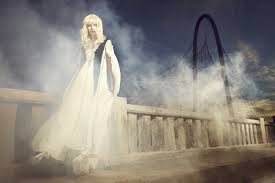Most American opera-goers know Erich Wolfgang Korngold’s Die tote Stadt (The Dead City) through recordings— if they know it at all. It simply isn’t done that much in this country. Friday night at Winspear Opera House, the Dallas Opera became only the fourth American company to present the 90-year-old work, in the process revealing the breathtaking power of the piece in live performance.
Composed in Vienna in 1920 and based on a novel written by Belgian author Georges Rodenbachin 1892, Die tote Stadt tells the story of a man who, still grieving the death of his wife several years earlier, compulsively becomes infatuated with a woman who resembles, in his mind, his dead wife—with predictably disastrous results. Besides providing a parable of the dangers of personal obsession and denial, the opera (as well as the novel on which it was based) symbolically presents the death of the old order in Europe in the late nineteenth and early twentieth centuries, along with a large dose of the conflict of secular and religious culture and ideas.
These themes (and thus the premise of Die tote Stadt) hold up well in 2014—unhealthy attachment to the past on both a personal and societal level is still with us—but it’s the gloriously energetic, relentlessly melodic music that make Die tote Stadt a late romantic masterpiece with enduring appeal.
The composer was only 23 when he completed the score (he would later flee the Nazi takeover of Austria in 1938, and go on to become one of the leading composers of Hollywood’s golden age), and the obvious influences of Wagner, Mahler, and Richard Strauss abound (along with strong hints of Debussy, Puccini, and, yes, Johann Strauss). But the magnificently crafted score surpasses all of these influences for sheer bravado of expression: hardly a phrase passes that doesn’t reek with the passion and fearlessness of youth.
German Sebastian Lang-Lessing, making his first appearance in Dallas, conducted with non-stop intensity Friday night, while soprano Mardi Byers moved from one glorious musical triumph to another in the difficult double role of Marie/Marietta, building a remarkable and compelling complexity of character along the way. Baritone Weston Hurt and mezzo-soprano Katharine Tier likewise turned in impressive performances in the secondary but also forbiddingly difficult roles of Frank and Brigitta, respectively. (The complexity of the orchestra part and the huge vocal challenges of the piece are probably the main reasons that Die tote Stadt has been neglected in America, making this Dallas production all the more significant.)
Given the extraordinary difficulty of the principal role of Paul, it seems almost unfair to point out that, although tenor Jay Hunter Morris managed to hold his part together and achieve a sense of completeness in the final scene, there were several moments when the strain of this gargantuan challenge was all too evident.
Danish-born Mikael Melbye designed and directed the production, which features extensive and well-integrated use of projected images, taking advantage of the Winspear Opera House’s state-of-the-art technical capabilities. Melbye’s only major miscalculation occurs in the confusing placement of the picnic scene in Act II, which is presented in a way that may lead the viewer to suppose that the picnic, which occurs outdoors, is inside Paul’s house.
The opera itself likewise contains one controversial point not included in the original novel: the inclusion of an epilogue in which the tragic ending is explained away as a dream. Although 21st century audiences may find this a bit forced on a dramatic level, Korngold’s compositional genius turns this dramatic weakness into an opportunity for a final, radiant conclusion to one of the most ravishingly beautiful scores of the 20th century.





